Hi everybody! My name is Carly Timm-Bijold and I’m a summer intern in the PR department here at New Moon! Before I was an intern, I spent six years on the Girls Editorial Board—from the time I was 9 to the time I “retired” at 15. Last week, I was given an incredible opportunity: two adults, three girl editors, another intern and I were invited to attend and present at the Girls International Forum (GIF) summit at Macalester College in St. Paul, Minnesota.
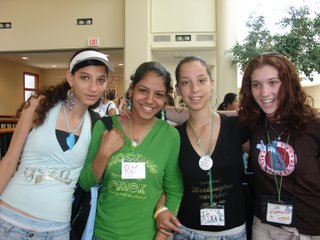 New Moon and the GIF have a long history—girls from the New Moon GEB who attended the International Girls Summit in Beijing, China in 1996 became some of the founders of the Girls International Forum. Today, GIF is a non-profit organization that empowers girls to take action on issues affecting girls now and in the future. Over its 12-year history, the GIF has sent girls ages 13-17 to forums, United Nations conferences and women’s rights conventions where they gain the skills necessary to affect change in their local and global communities.
New Moon and the GIF have a long history—girls from the New Moon GEB who attended the International Girls Summit in Beijing, China in 1996 became some of the founders of the Girls International Forum. Today, GIF is a non-profit organization that empowers girls to take action on issues affecting girls now and in the future. Over its 12-year history, the GIF has sent girls ages 13-17 to forums, United Nations conferences and women’s rights conventions where they gain the skills necessary to affect change in their local and global communities.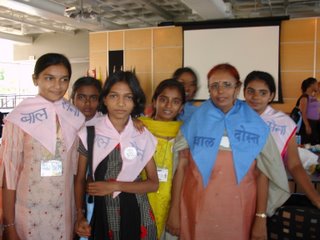 Several years ago, the GIF decided to host an International Girls Summit in 2006 to provide girls' teams from all over the world with training opportunities in the form of workshops and lectures. The goal of the Summit was to supply girls with tools they could use to take action in their native countries regarding a certain ‘plank’ or area of concern, such as eliminating HIV/AIDS or ending gender-based violence. Over the course of eight days, the girls attended workshops and seminars that taught them how to bring about the change they desired with a specific focus on utilizing the media to spread a message. This is where we came in. New Moon’s role at the conference was to teach girls the skills they need to influence people through print media.
Several years ago, the GIF decided to host an International Girls Summit in 2006 to provide girls' teams from all over the world with training opportunities in the form of workshops and lectures. The goal of the Summit was to supply girls with tools they could use to take action in their native countries regarding a certain ‘plank’ or area of concern, such as eliminating HIV/AIDS or ending gender-based violence. Over the course of eight days, the girls attended workshops and seminars that taught them how to bring about the change they desired with a specific focus on utilizing the media to spread a message. This is where we came in. New Moon’s role at the conference was to teach girls the skills they need to influence people through print media.We arrived at Macalester at about 10:00 on Wednesday night—the third night of the conference. We were introduced to the GIF team and I was pleasantly surprised to recognize some of the girls who graduated around the time I first started on the board. After an hour-long rehearsal of the next day’s three-hour-long presentation, I was ready for bed, but ended up staying up past two in the morning making final updates on the PowerPoint I had designed for the following morning’s presentation and talking to former GEB member Rachel Johnson, one of the Girl Mentors at the summit.
 Although I thrive on last-minute preparation and the stress it entails, when my alarm went off at 6:15 the next morning, I was feeling less than prepared to give a presentation the length of which would be nearly equivalent to the amount of sleep I had received the night before. However, I woke myself up pretty quickly and explored my new surroundings. I had never stayed in a dorm before, and since I’m starting to look into colleges, the experience of staying on a campus was invaluable. After I got ready, I joined the rest of the group and we headed down to a world-class breakfast at the Ruth Stricker Dayton Campus Center. Then we found the auditorium in which we would be delivering our two three-hour-long workshops that day.
Although I thrive on last-minute preparation and the stress it entails, when my alarm went off at 6:15 the next morning, I was feeling less than prepared to give a presentation the length of which would be nearly equivalent to the amount of sleep I had received the night before. However, I woke myself up pretty quickly and explored my new surroundings. I had never stayed in a dorm before, and since I’m starting to look into colleges, the experience of staying on a campus was invaluable. After I got ready, I joined the rest of the group and we headed down to a world-class breakfast at the Ruth Stricker Dayton Campus Center. Then we found the auditorium in which we would be delivering our two three-hour-long workshops that day.Our first presentation was attended by teams from Nigeria, South Africa, Washington D.C. and Indonesia. Over the course of three hours, we taught the teams how to write persuasive pieces with a focus on letters to the editor. I was immediately struck by the diversity of our audience, the eagerness of the girls to learn (despite language barriers) and the experience of presenting alongside a translator. We formatted our presentation in a way that allowed roughly 30 minutes of presentation time followed by an additional 30 minutes of breakout sessions that allowed the girls to apply the strategies they had just learned to their individual team planks.
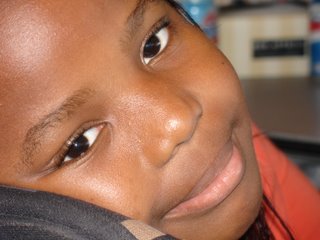
During this first session, I helped the Nigerian team write a letter to their principal asking for permission to start a theatre club at school that would raise awareness about HIV/AIDS. At first, I expected the session to be just like every other writing workshop I had ever taken or taught, but I think I actually learned more from the girls than I taught them. I was inspired by their eagerness to create change around this prevalent issue in their country and proud that I could be a small part of making that happen. I thought I knew a lot about HIV/AIDS from years of health classes but as I soon discovered, I knew nothing about the effects that it could have on an entire nation. During one of our longer breakout sessions, we just stopped writing for a while and I listened as the girls told stories about their personal experiences with the disease. The most powerful stories from my point of view were the ones about girls who couldn’t afford to pay their school fees so they turned to prostitution, became infected with HIV/AIDS and died soon after, not able to receive the proper medicine or benefit from the education for which they had made the ultimate sacrifice. HIV/AIDS is a problem of epidemic proportions in their country and I was shocked to learn that one out of every 11 people in the world with AIDS is from Nigeria. After hearing a dozen stories like this, I was shocked and was reminded (as I would be many times over the course of my time at the conference) how small we are as individuals in the big scheme of things. I was also honored to be working with these beautiful girls who had witnessed some of the most horrible things imaginable yet were determined to keep a positive outlook and work for change. I was totally unprepared for what I saw, felt and learned during those three days and always felt as though I was in the presence of truly courageous girls.
 After our first presentation, we met as a team to debrief and make some notes on what we would change about our seminar for that afternoon. One thing we all had to teach ourselves was how to pace our speaking style to be more in sync with the translators. Lunch was held in our dorm building, “30 Mac,” and we crashed in my room for a while before heading out to do some browsing in the neighborhood that surrounds Macalester. At two that afternoon we gathered for our second presentation and this time we were joined by teams from India, Israel, Kenya and Minnesota. Our presentation went smoothly, but we noticed that the Israeli team was absent for a large portion of the first session.
After our first presentation, we met as a team to debrief and make some notes on what we would change about our seminar for that afternoon. One thing we all had to teach ourselves was how to pace our speaking style to be more in sync with the translators. Lunch was held in our dorm building, “30 Mac,” and we crashed in my room for a while before heading out to do some browsing in the neighborhood that surrounds Macalester. At two that afternoon we gathered for our second presentation and this time we were joined by teams from India, Israel, Kenya and Minnesota. Our presentation went smoothly, but we noticed that the Israeli team was absent for a large portion of the first session.As we split into groups, I was re-directed from the Kenyan team to the Israeli team, which had just walked in looking shaken and distracted. The girls had just spoken over the phone with their families in the wake of one of the first Hezbollah bombings in Israel. As trivial and unfeeling as it seemed at the time, I jumped right in to my spiel, trying to explain what they had missed through two female translators Batya and Abeer. Out of the eight girls present at the session, four were Muslim and four were Israeli. Ever since 9-11, our country has focused a great deal of media attention on these two religious groups and painted them as being something completely separate from American culture. I was surprised and fascinated, therefore, to see that these girls were just like me—we listened to the same music, wore the same clothes and even used some of the same jargon. At the same time, I was quickly digesting all the ways in which we are different. Although we were all the same age (16 or 17), they had a maturity about them which I did not. It took me a moment to realize some of the things they have had to witness in their lives and how it was reflected in their mannerisms—their perfectly straight postures, their troubled-looking eyes and the tone of their voices when they described the ongoing conflicts in their country. Like the Nigerian team, however, they were all eager to help improve the state of their country. Their platform of choice was the empowerment of women, particularly in government. They told me that women in Israel (no matter what their religion) have few rights and those they do have, they don’t always know about. According to Batya, this unawareness has lead to a parliament in which only 12% of the seats are held by women and thousands of young girls are prisoners in their own homes, denied an education or a real say in what they do with their lives.
After our discussion, we brainstormed ways they could address this issue. They were incredibly insightful and decided that the best course of action for them to take was to address educators, corporations and government officials who would ideally provide them with funding for a mentor program for young girls. The program would teach girls about all the career options they had available to them, as well as educate them about the rights they have as citizens of Israel. During this time I was working primarily with an Arab girl named Lina, who was shy at first but gradually became the leader of the entire discussion. As I learned more about their vision for their country, I was deeply struck and somewhat saddened by the fact that when confronted with all the negative media images we see of the Middle East, we don’t learn about girls like the ones I met at this conference. They have a positive action plan for their country and want to improve their communities, not through violence, but through the persuasive power of the media.
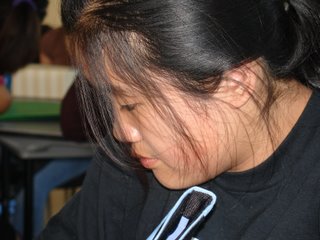 As we got back into a large group, I learned more about the topics of the other groups as I listened to the "hooks" they had prepared for their letters. I was particularly interested in the preliminary hook the Kenyan team (which was tackling educating the girl-child) had prepared: “They say that education is life; if this is true: are we really living?” These girls were incredibly articulate and there was something very striking about hearing a letter read in someone’s native language and appreciating it for the beauty of its words and then hearing translated and appreciating it for the beauty of its meaning. Although the Israeli girls had to leave again before the end of the session, I thought that it had gone very well. Most importantly, the groups had learned a lot from each other.
As we got back into a large group, I learned more about the topics of the other groups as I listened to the "hooks" they had prepared for their letters. I was particularly interested in the preliminary hook the Kenyan team (which was tackling educating the girl-child) had prepared: “They say that education is life; if this is true: are we really living?” These girls were incredibly articulate and there was something very striking about hearing a letter read in someone’s native language and appreciating it for the beauty of its words and then hearing translated and appreciating it for the beauty of its meaning. Although the Israeli girls had to leave again before the end of the session, I thought that it had gone very well. Most importantly, the groups had learned a lot from each other.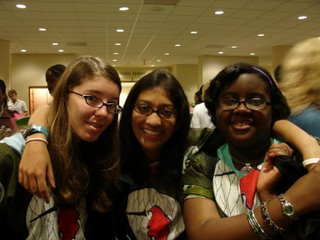
After this presentation, the group headed to dinner in the student center before attending a presentation on leadership skills taught by Girl Scout Global Action Leader Jin In. All the teams were assigned a real-life situation and were challenged to come up with a diplomatic solution. The New Moon group partnered up with the girls from Soul Touch (who were also presenting at the conference) and together, we talked how we could lobby for a bill that would give $4,000,000 to girls education programs. As I listened to the other groups present, I was amazed to learn that not only were these girls intelligent and articulate, but diplomatic as well. They have learned from conflicts in their country to come up with solutions that benefit all parties concerned.
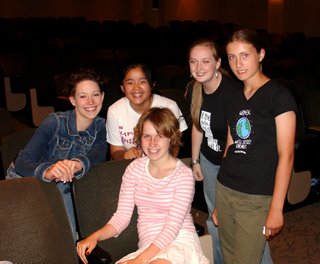 Next, team New Moon went to Jamba Juice to talk about the day and to people-watch before heading back to the dorm to play Pictionary. Then, just as the night was winding down, we heard someone yell, “PARTY”! Two GEB girls, our intern Heather and I ran over to the international dorm complex and started dancing with all the teams! It was one of the most surreal things I’ve ever done—all these girls knew all our music and pretty soon everyone was singing along to a Sean Paul song or gyrating to “Hips Don’t Lie.” The Israeli girls were phenomenal dancers and they laughingly tried to teach me some moves. Although I’m not sure how successful they were, the evening was one of the most exciting of my life. I was surprised to notice how friendly everybody was—there was no judgment or criticism. We were all there working towards a common goal and that was enough.
Next, team New Moon went to Jamba Juice to talk about the day and to people-watch before heading back to the dorm to play Pictionary. Then, just as the night was winding down, we heard someone yell, “PARTY”! Two GEB girls, our intern Heather and I ran over to the international dorm complex and started dancing with all the teams! It was one of the most surreal things I’ve ever done—all these girls knew all our music and pretty soon everyone was singing along to a Sean Paul song or gyrating to “Hips Don’t Lie.” The Israeli girls were phenomenal dancers and they laughingly tried to teach me some moves. Although I’m not sure how successful they were, the evening was one of the most exciting of my life. I was surprised to notice how friendly everybody was—there was no judgment or criticism. We were all there working towards a common goal and that was enough. The next morning, the dancing and lack of sleep started to catch up with me. I couldn’t stay tired for long, though, because it was Global Girls Day and after breakfast, it was time for the international teams to present their planks. It was really interesting to see the culmination of a week’s worth of work and how what we had taught the girls the day before fit into their overall presentation. For the rest of the morning we split into groups of individuals from all the countries and attended workshops of our choosing. Although New Moon presented two different workshops that day (involving creative writing and writing a letter to Congress), I decided to split off from the group and go to some sessions from which I could learn things that would help me at New Moon and in leadership organizations at my school. In the morning I went to a session on visual media and learned about the use of film, television and photography to sway people’s emotions. The presentation was lead by Robin Hickman—the niece of legendary black photographer and film maker Gordon Parks—and the girls from Soul Touch. After lunch we were treated to more plank presentations and then it was off to another workshop. This time, I attended the lobbying workshop lead by a member of Wellstone Action. In this class, I learned the whos, whats, whens, wheres, whys and hows of lobbying. We also practiced lobbying for a mock bill that would make education mandatory until the age of 18.
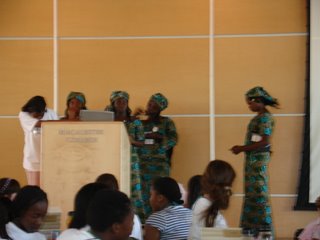 The day wrapped up with a few closing remarks by members of the GIF team of girl mentors and then we all went to 30 Mac for an ice cream social before the New Moon team said our goodbyes and left for Duluth. Being a part of this forum was one of the most significant events of my life. Not only did it give me global and personal perspective, but I got to go places, learn things and meet people that I probably never would have otherwise. I’m so grateful for this opportunity, mainly because learning that there are young women out there who have such a strong desire to create real, powerful and dramatic changes in our global community gave me hope for the future of girls all over the world.
The day wrapped up with a few closing remarks by members of the GIF team of girl mentors and then we all went to 30 Mac for an ice cream social before the New Moon team said our goodbyes and left for Duluth. Being a part of this forum was one of the most significant events of my life. Not only did it give me global and personal perspective, but I got to go places, learn things and meet people that I probably never would have otherwise. I’m so grateful for this opportunity, mainly because learning that there are young women out there who have such a strong desire to create real, powerful and dramatic changes in our global community gave me hope for the future of girls all over the world.



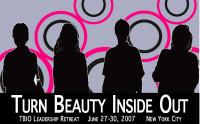
1 comment:
Wow, thats a chance of a lifetime Carly! You are so lucke that you had that oppurtunity! I was wondering, do you keep in touch w/ some of the girls?
Post a Comment